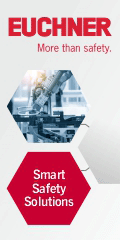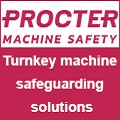
Posted to News on 13th Nov 2018, 11:29
mayr brake technology used in Hyperloop pod
Johannes Liebl of mayr power transmission outlines how brake components from his company have helped the Hyperloop pod created by the team from the Technical University of Munich come safely to a standstill.
Shooting through a vacuum tube at approximately 1000km/h, mastering the rail section between Munich and Hamburg in only 40 minutes - it sounds like science fiction, but for Tesla founder and major visionary Elon Musk, this is the future of mobility. With his ambitious Hyperloop project, the US entrepreneur, who is also the man behind the private space travel company Space X, wants to revolutionise public long-distance transport. In order to advance developments in this field, Musk and Space X put a competition out to tender every year. Teams from across the world may take part with their prototypes - and this year the WARR Team from the Technical University of Munich won once again. Also on board: Brakes know-how by mayr power transmission.
After his achievements with Tesla and Space X, Elon Musk now wants to make his next mark in the mobility landscape with the Hyperloop. The technology is new and just as spectacular as the speeds it purports to reach: A partial vacuum of 0.3bar is generated in a tube. A capsule, similar to a high-speed train, utilises an electric drive and a magnetic levitation system. Through the reduced air resistance and the low friction, the capsule can reach speeds of approximately 1000 km/h. The required energy is to be produced from regenerative sources. In this way, even large distances could quickly be bridged and rail transport would be on the verge of a revolution.
From vision to reality through a competition
However, up until now this miracle train only exists as an ambitious concept. To change this, and to turn his vision into reality, Elon Musk and his company Space X regularly put a competition out to tender. Teams from across the world can develop and submit a prototype of a so-called pod, i.e. a Hyperloop drive unit. These pods then compete against each other on a 1.2km-long test section and the fastest wins!
The winner of the current competition held in July 2018 is, as was the case twice in the previous years, the team from the Technical University of Munich. The students at the "Wissenschaftlichen Arbeitsgemeinschaft fr Raketentechnik und Raumfahrt' (Scientific Consortium for Rocket technology and Space Travel, German abbreviation: WARR), reached a speed of 467km/h during their successful competition run. They left their competitors well behind them, and came close to achieving their pod's possible maximum speed of approximately 600km/h before having to decelerate.
Safe braking using know-how from the Allgu region
On board the WARR pod prototypes, innovative brakes know-how from Mauerstetten in the Allgu region ensured safe, reliable deceleration. This is no easy task; after all, the pod has to come safely to a standstill from this enormous speed across a distance of approximately 200m. Adrian Kobras, who is responsible for the brakes in the WARR Hyperloop Team, described the challenge: "The competition section consists of a long rail which comprises of several individual pieces. However, these parts do not fit together with 100 per cent accuracy; small irregularities occur frequently. That's not really a problem when travelling, but the pod brakes directly on this rail. This makes things more difficult - in the worst-case scenario, the lining can be ripped off the pad. That would of course prove fatal for the pod."
Therefore, mayr developed accurately fitting friction pads made from aluminium for the WARR Team and adhered the linings onto these pads. Subsequently, the linings were re-worked. Special rounding and chamfers on the edges ensured that the braking system can compensate for the irregularities and can decelerate safely whilst reliably remaining intact.
Reliable friction technology for Brake Technology 4.0
The significance of the friction technology for high-quality brakes is particularly apparent in this example. It is, in addition to the innovative controls and consistently-considered safety principles, a core component of the Brake Technology 4.0 by mayr. Even the manufacture of the friction pads demands comprehensive experience and knowledge. In order to position the lining accurately to the pad, appropriate adapters had to be produced. The pad plates, too, must be an accurate fit. A further challenge was to adhere the linings reliably onto the aluminium pads.
Johann Huber, Test Manager at mayr power transmission explains: "The selection of a suitable adhesive system was decisive both in the case of the aluminium and the pad material for achieving the safety levels in practical application. It is also of interest with regard to the ratio between the rigidity and stability and the low weight. This is the case, for example, when it comes to lightweight constructions that have to be as robust as possible, like the Hyperloop vehicles with their extreme speeds."
In numerous tests, experts at mayr therefore determined the method of adhesion which was able to withstand highly-dynamic braking from such a high speed. For the competition pod, mayr supplied 50 components ready for installation comprising the linings, pads and adapters.
The team from mayr power transmission would like to warmly congratulate the WARR Hyperloop Team from the TU Munich on this year's victory, and thus on their hat trick!
Learn more at www.mayr.co.uk.
Want the latest machine building news straight to your inbox? Become a MachineBuilding member for free today >>
10/11 Valley Road Business Park
Valley Road
BD21 4LZ
UNITED KINGDOM
+44 (0)1535 663900















